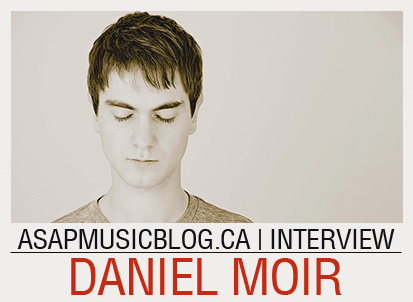
October is a busy month for Daniel Moir, and it has barely begun.
Yesterday marked the release of his third independently released album, Monday Morning, and tomorrow (Thursday October 3rd) is the album release party at The Railway Club, which also signifies the start of a short tour through BC, Alberta, and Washington. For more information on the release party, and for the rest of the tour, check out: http://www.danielmoir.com/.
We had the opportunity to chat with Daniel about the process of making his new record and his songwriting process.
.
.
asapmusicblog: Today is the first day of October, and it’s the start of a big month for you with the release of Monday Morning, and a tour beginning in a few days. How has all of that been sinking in for you?
Daniel Moir: Yeah, it’s kind of crazy because it’s been such a long process getting the songs that I’ve been writing for up to three years time and thinking about it for so long. The recording process just about killed me, and I worked so hard on that for quite a long while as well – so it kind of feels like it was never going to quite get here. I woke up this morning and did all the release stuff, and it’s just a pretty surreal feeling today.
a: What was the vision that you had in mind when you were in the process of creating Monday Morning?
DM: Whenever I make an album I find that it’s usually I don’t so much have a vision in mind, and then create the album to try to match that vision, it’s more just that the songs kind of flow naturally. I kind of write songs without really… they kind of just come to me, sort of – I just get the inspiration. They tend to have their own sculpted sound in a cohesive manner after all the recording process is done. I’m just changing over time and as a songwriter, so the songs change as well and that usually gives each album its own sound. So I didn’t really have necessarily a vision in mind, it just came together almost on its own.
a: For this album, you took on a bigger role – not only writing and arranging, but you also took on the producing, mixing, and engineering the album, as well as the instrumentation. What was the process like with making this album compared with the first two?
DM: Like you said, I did all of the production and recording myself for this one. It was something I’ve always wanted to do but I didn’t have quite have the know to do it. I’ve always wanted to be a producer, but I didn’t really have the confidence because it seemed like such an overwhelming thing to get into. This year I just decided to finally suck it up and invest the time and the money to really learn what button does what, and I guess I was kind of getting an education when I was working with producers in studios in the past.
Usually I have the songs already produced when I go into the studio, and it’s just a matter of getting them down in recording, and the producer a lot of the time acts as the engineer. So I’ve always thought that it would be a more efficient way if I could just handle everything myself, so I wouldn’t have to worry about communicating it to anyone because I already know what’s going to do what. I just have to get it done, and it’s a lot quicker of a process. I actually enjoyed it, having a lot more having creative control over the whole process this time.
a: You are originally from Edmonton, but you’ve been living in Vancouver for a couple of years now. How do you find the local music scene here?
DM: People, I find, are people no matter where you go – music is music. But every city kind of sculpts its own sound, because people tend to assimilate with each other. I find the Vancouver scene to be… it’s all pretty similar. Edmonton is a lot more alternative coming out, stuff that’s a lot farther left wing. Some people may disagree with me, but I find that a lot of the popular stuff in Vancouver has a little bit more of a conservative pop sound to it. There’s obviously a lot of underground stuff, and there’s a lot of alternative stuff, but I find the stuff that is really alternative gets all the attention in Edmonton, and the stuff that is a little bit poppier gets more attention in Vancouver. Probably just because it’s a bigger city with more money, and a little bit more of an industry catered to radio stuff. I could be totally off, but that’s just an observation of mine.
a: So your tour is starting off with the release party this Thursday at The Railway Club – for those who haven’t seen you perform, what can they expect from your live shows?
DM: For Thursday, I’ve got a band lined up, there’s going to be drums, bass, and some violin – the same drummer and the same violinist that played on the record. The drummer, I’ve been playing with since 2007, so he’s been with me for quite awhile. I’ve got also the trumpet player who played the record who is going to play on her song, and a couple of other people will be joining in on different songs. So it will be a core of a four-piece band and then some guests coming on throughout the night.
a: If you could narrow down a single message that you would want your music to convey, what would might that be?
DM: I don’t know if there’s a spoken message per say, but I’ve always thought that music is for the purpose of helping people through difficult times and you’re accounting people’s days – kind of just a general morale booster for humanity, I guess. So if my music could do that for a couple of people, that’s pretty incredible to me, because I enjoy the process quite a bit. If there’s one or two people that get as much out of it as I do, then that’s good enough for me.
